Delaware Documents
Quitclaim Deed
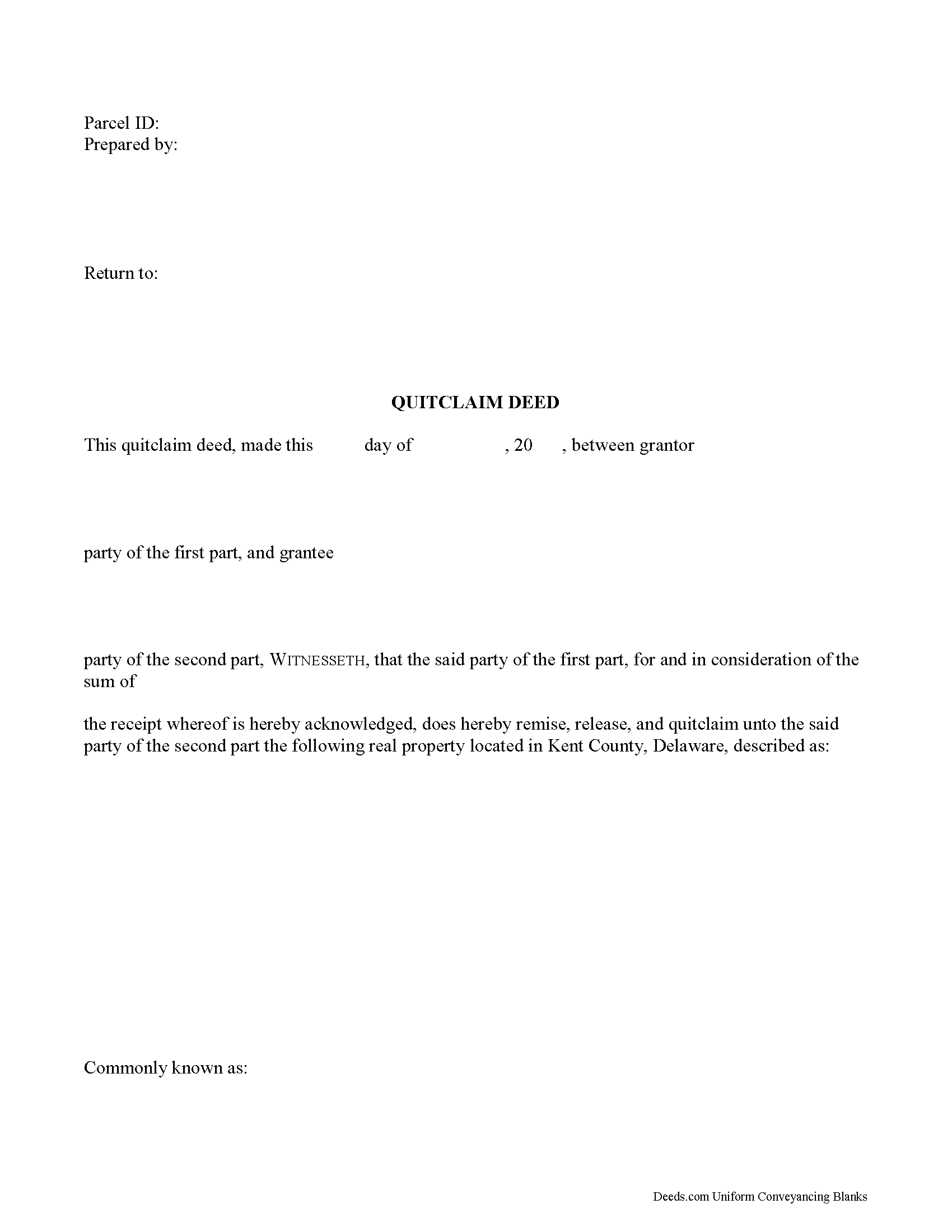
Delaware Quitclaim Deed Content Requirements:
25 Del. C. 121 presents the basic statutory form for a deed. This form, however, contains the words "grant and convey," which imply certain warranties of title. A correctly modified quitclaim deed replaces those terms with "quitclaim," thereby excluding warranty protection. In addition, a properly executed quit claim deed requires specific information, including the name and address of both the grantor and grantee; the grantee's vesting choice (how to hold title to the property); a complete legal description of the property to be conveyed; the county tax assessment parcel ID (if available); the date the quit claim deed is executed; the grantor's signature; the signature of one witness who is not named elsewhere in the document (the notary may serve as the witness); and an acknowledgement by a notary public or other official certified to administer oaths. In addition, if the quit claim deed conveys property that is already in the public records, provide the details from the transfer wherein the grantor gained ownership.
Recording:
25 Del. C. 9605 directs the rules for recordation of instruments. Delaware's division into only thr... More Information about the Delaware Quitclaim Deed
Gift Deed
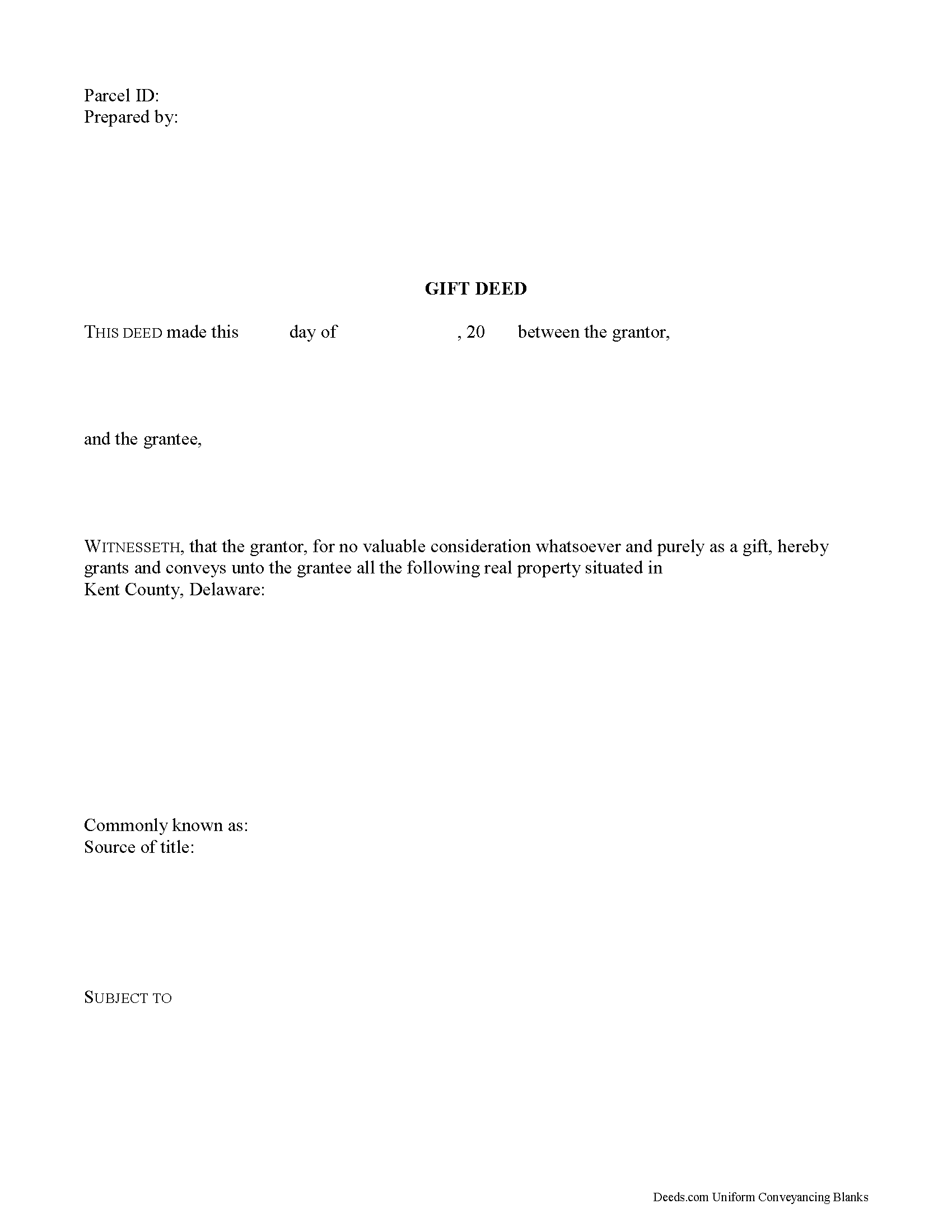
Gifts of Real Property in Delaware
Gift deeds convey title to real property from one party to another with no exchange of consideration, monetary or otherwise. Often used to transfer property between family members or to gift property as a charitable act or donation, these conveyances occur during the grantor's lifetime. Gift deeds must contain language that explicitly states that no consideration is expected or required. Ambiguous language, or references to any type of consideration, can make the gift deed contestable in court.
A lawful gift deed includes the grantor's full name and marital status, as well as the grantee's full name, marital status, vesting, and mailing address. Vesting describes how the grantee holds title to the property. Generally, real property is owned in either sole ownership or co-ownership. For Delaware residential property, the primary methods for holding title are tenancy in common and joint tenancy. An estate conveyed to two or more people is presumed a tenancy in common, unless a joint tenancy is specified (25 Del. C. 701).
As with any conveyance of realty, a gift deed requires a complete legal description of the parcel. Recite the source of ... More Information about the Delaware Gift Deed
Warranty Deed
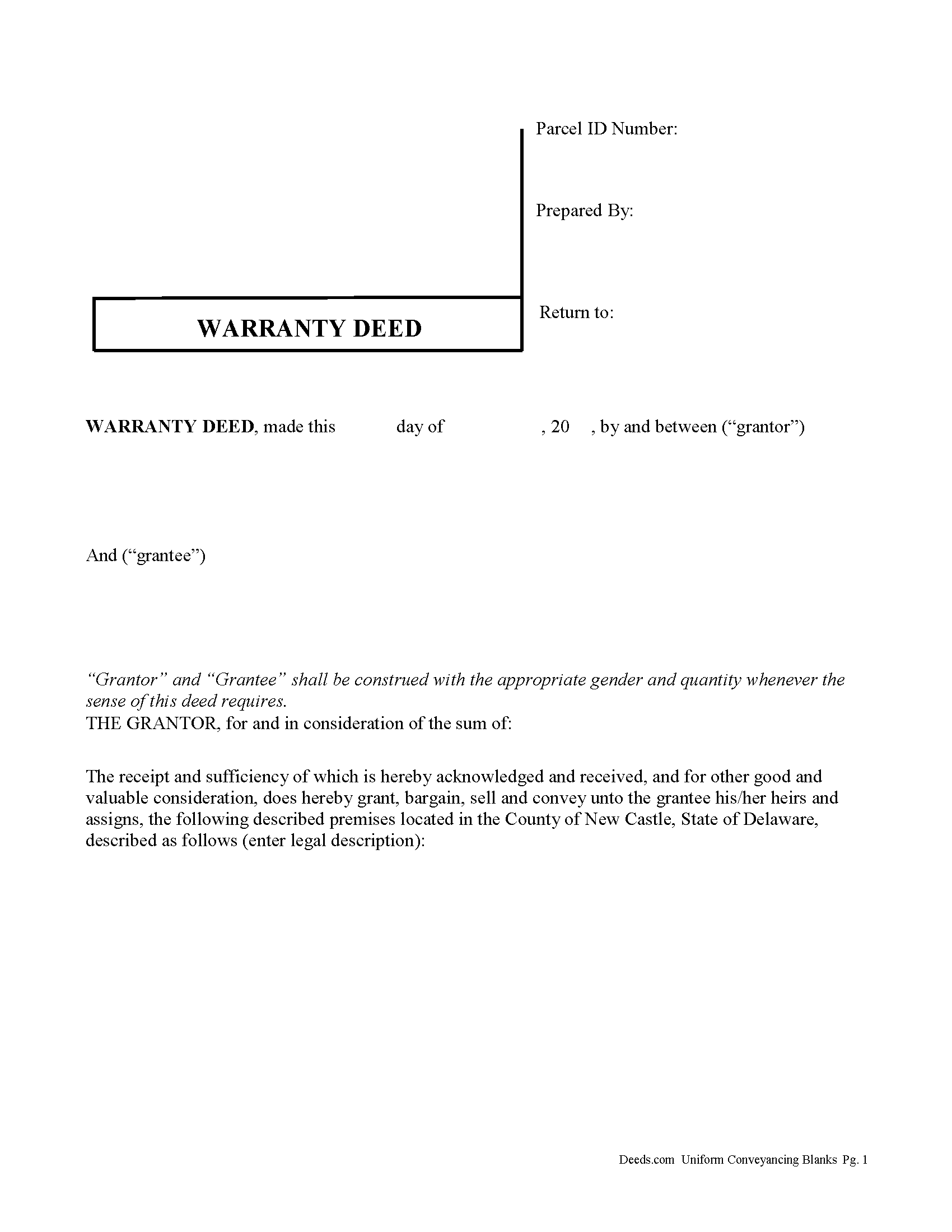
The possession of land, tenements, and hereditaments in Delaware can be transferred by a deed in writing and the legal estate will accompany the use and pass with it ( 101). A form for a conveyance of real estate is presented in 121 of the Delaware Revised Statutes. This form, if duly executed and acknowledged, is sufficient for a conveyance of real estate. However, the words "grant and convey" will operate as a special warranty against the grantor. But, in a warranty deed, the grantor warrants the title to the property to be indefeasible by anyone whether arising before or during the grantor's ownership.
Warranty deeds must be signed by the grantor and acknowledged before they can be recorded. A deed for the conveyance of lands can be acknowledged in any county in Delaware, by any party to the deed, in the Superior Court, before any judge in Delaware, notary public, before two justices of the peace for the same county, or before the mayor of the city of Wilmington. Alternatively, a deed can be proved in the court by one or more of the subscribing witnesses ( 122). The acknowledgement or proof of the warranty deed should be in a certificate that is attached to or endorsed on t... More Information about the Delaware Warranty Deed
Special Warranty Deed
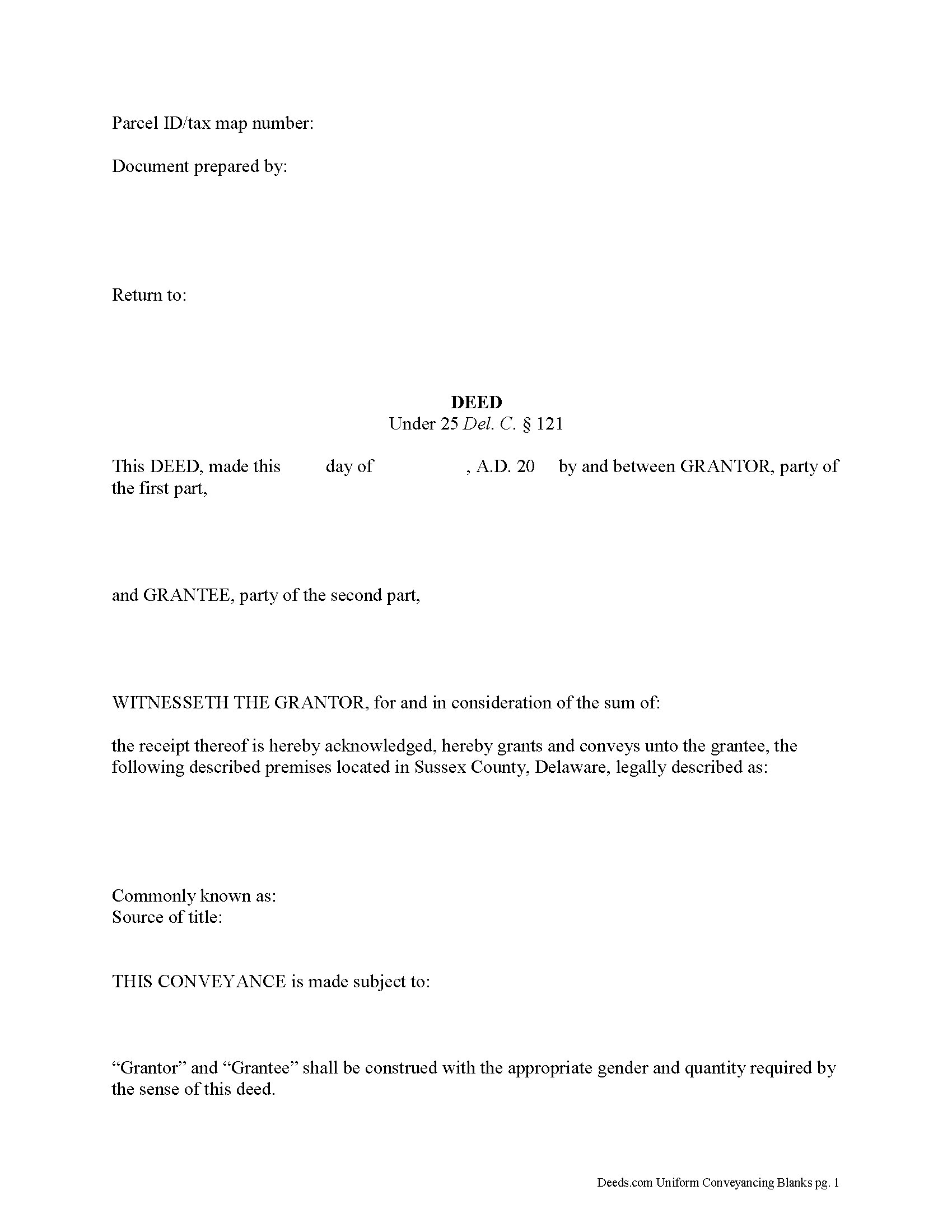
The statutory form for a real estate deed in Delaware is provided in 25 <i>Del. C.</i> 121. The text includes the words "grant and convey" in the granting clause, which operate as a special warranty against the grantor, the grantor's heirs, and all persons claiming under the grantor or his heirs ( 121b). The grantor guarantees that, during her time of ownership, she did nothing to encumber the property, and any established restrictions are clearly stated in the deed. This statutory deed is commonly used in residential and commercial real estate transactions in Delaware.
A deed in Delaware can be acknowledged in any county by any party to the deed in the Superior Court, or before any judge in Delaware, or notary public, or before two justices of the peace for the same county, or before the Mayor of the City of Wilmington. A deed may also be proved in the court by one or more of the subscribing witnesses ( 122). A certificate of acknowledgment, certified by the officer taking the acknowledgment, must be endorsed on or attached to the deed ( 123). Special warranty deeds can also be acknowledged out-of-state according to the provisions of 129 and will be valid in Delaware.
Spec... More Information about the Delaware Special Warranty Deed
Grant Deed
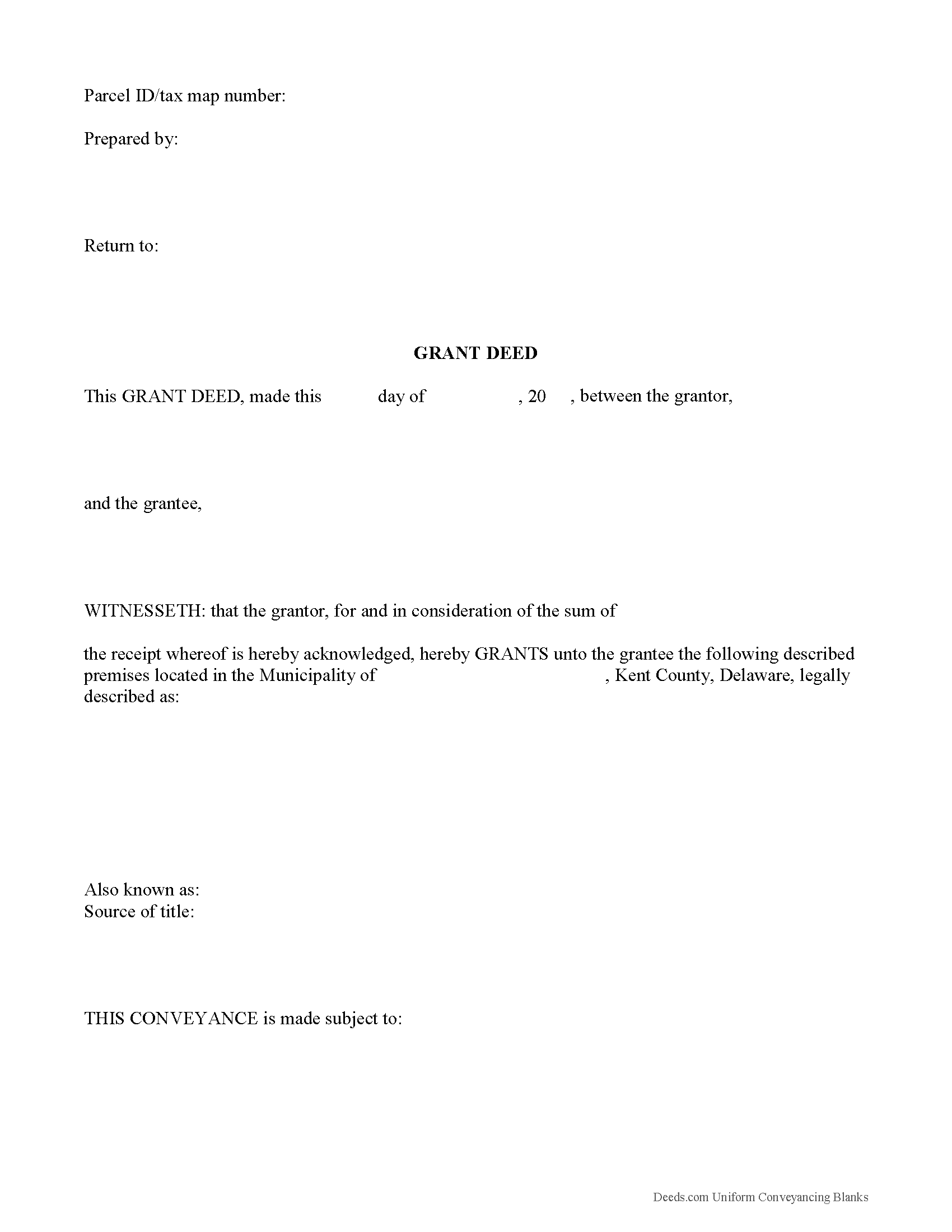
The possession of land, tenements, and hereditaments in Delaware can be transferred by a deed in writing. The legal estate will accompany the use and pass with it (25 Del. C. 101). A form for the conveyance of real estate is presented in 121 of the Delaware Revised Statutes. This form, if duly executed and acknowledged, is sufficient for the conveyance of real estate.
The words "grant and convey" in any deed will, unless specifically limited or restricted, operate as a special warranty against the grantor and the grantor's heirs and all persons claiming under the grantor (121). A grant deed contains some covenants of warranty, but is not as extensive as a warranty deed. In this type of deed, the grantor warrants that he or she has not previously conveyed the estate being granted and has not encumbered the property except as may be stated in the deed.
A lawful grant deed includes the grantor's full name and marital status, as well as the grantee's full name, marital status, vesting, and mailing address. Vesting describes how the grantee holds title to the property. Generally, real property is owned in either sole ownership or co-ownership. For Delaware residential property, ... More Information about the Delaware Grant Deed
Correction Deed
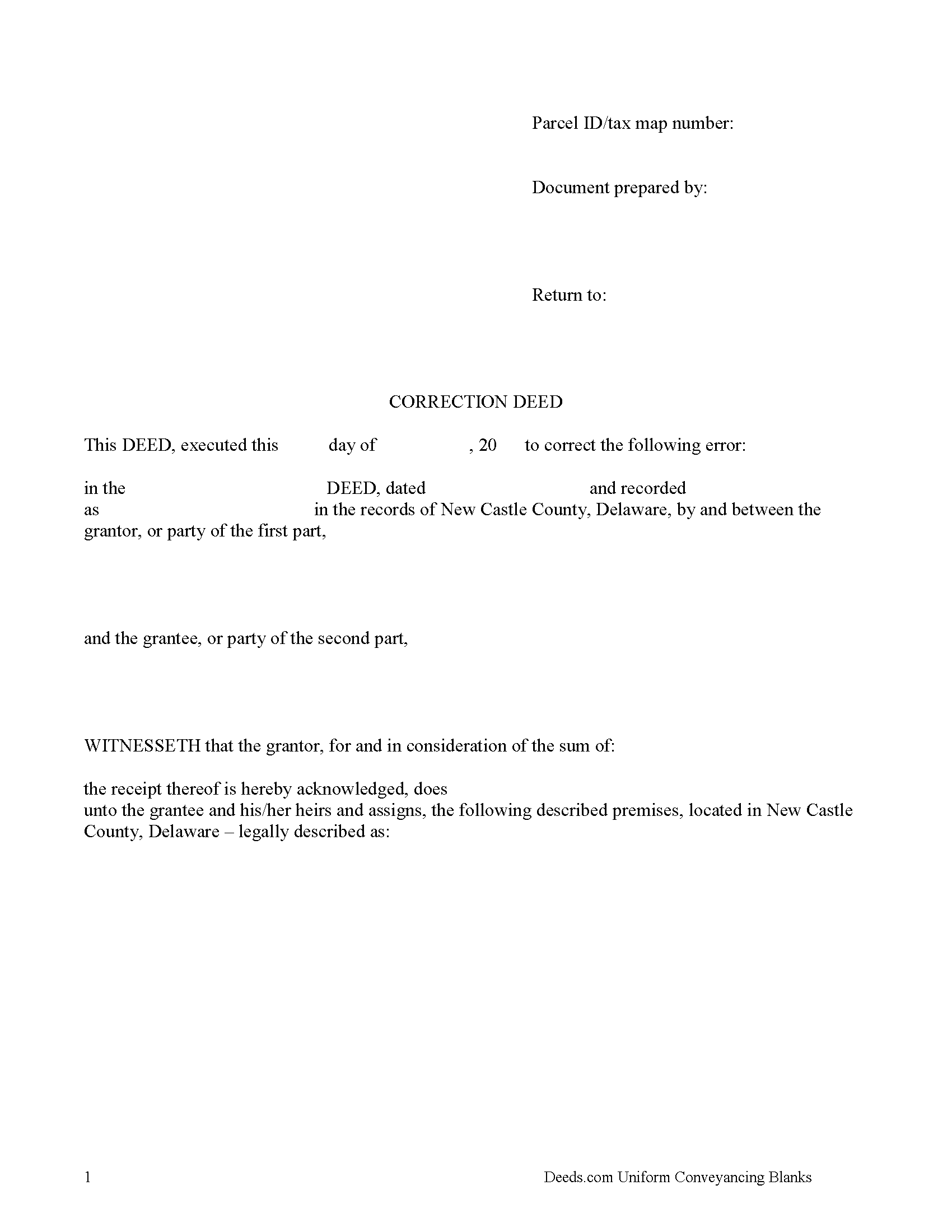
Use the correction deed to correct an error in a previously recorded deed of conveyance in Delaware.
Correcting an error in a recorded deed helps prevent problems that might arise when the current owner tries to sell the property. The best method for correction is to prepare and record a new document, a so-called correction deed. This document does not convey title; instead, it re-enacts and confirms the prior conveyance of the property.
Apart from supplying the correct information, the new deed must give the reason for correcting, and it must reference the prior deed by title, date, and recording number. The original grantor must sign again, thus confirming the property transfer to the same grantee. Generally, corrective deeds are used to address minor errors in a deed, such as typos, accidentally omitted suffixes or middle initials in names, and other minor omissions. When in doubt about the gravity of an error and whether a correction deed is the appropriate vehicle to address it, consult with a lawyer.
For certain changes, a correction deed may not be appropriate. Adding or removing a grantee, for example, or altering the manner in which title is held, or making mater... More Information about the Delaware Correction Deed
Easement Deed
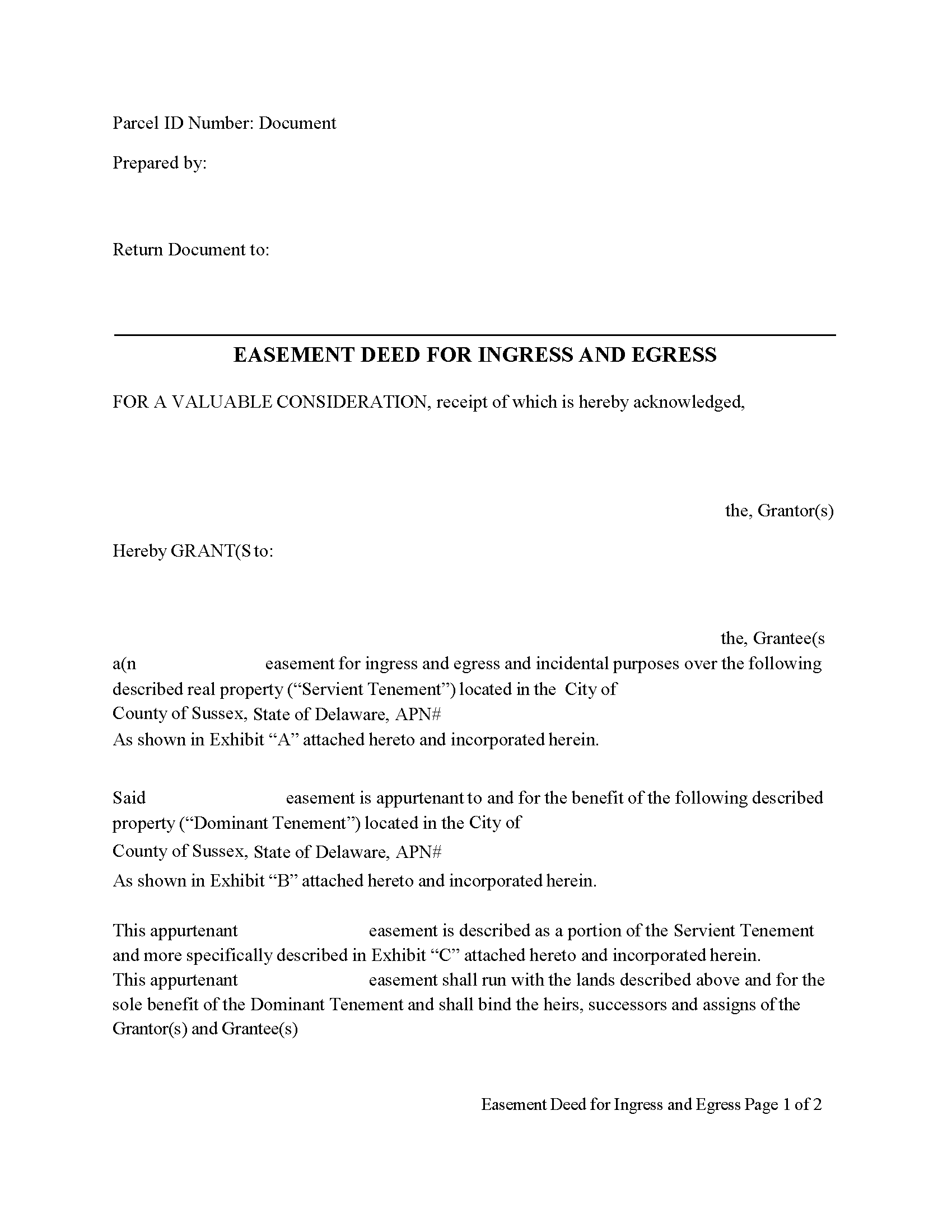
An easement deed in Delaware gives the easement holder a right to use the land of another for a specific purpose. This type of agreement gives the easement holder a non-possessory interest in the land. Once the easement has been granted, the grantor may not interfere with the grantee's use of the easement. Additionally, the easement holder generally cannot expand his use of the easement beyond the original purpose for which it was granted. Easements fall into two categories: an easement in gross or an easement appurtenant.
An easement in Delaware can be created by an express easement, an easement by prescription, or, an easement by necessity. A conservation easement, created for the purpose of protecting property, can also be created by a voluntary agreement that allows a landowner to limit the type or amount of development, while allowing the owner to maintain private ownership. Conservation easements are created in the same manner as other easements in this state ( 6902).
As an instrument that affects title to real property, an easement deed in Delaware must be signed by the grantor and duly acknowledged before it is presented for recording. An easement deed can be acknow... More Information about the Delaware Easement Deed
Trustee Deed
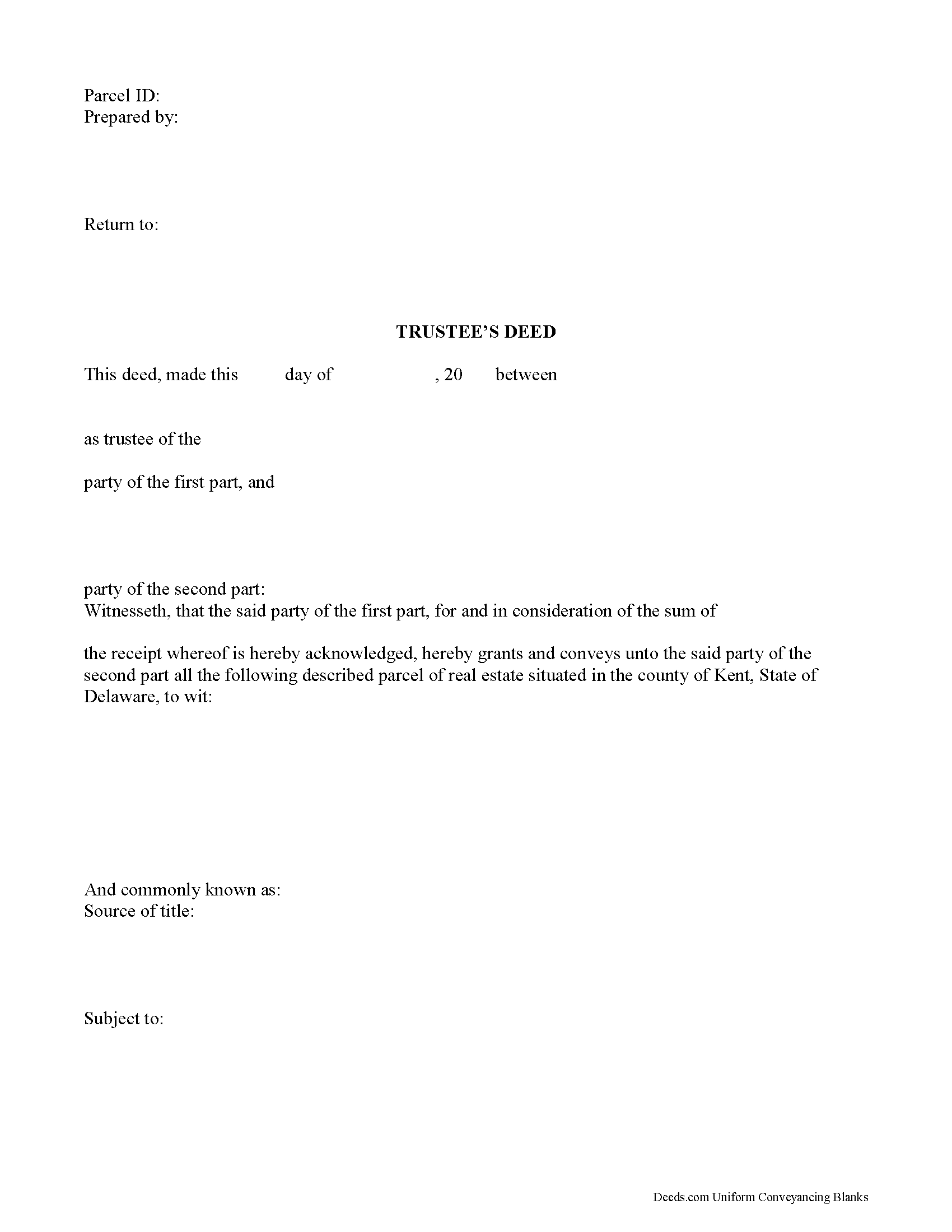
Used in trust administration, a trustee's deed conveys real property out of a trust and vests title in the name of a grantee. Unlike other instruments of conveyance, this deed is named for the person executing the deed rather than the type of transfer it is.
A trustee is the person who holds legal title to trust property in the name of the trust. The trustee is appointed in the trust instrument, an unrecorded document executed by a trustor, who funds a trust with assets. The powers of the trustee relevant to the conveyance of real property are also enumerated in the trust instrument.
The trustee's deed follows the statutory form for conveyances of real property in Delaware (Del. Code tit. 29, 121(a)). Pursuant to Del. Code tit. 29, 121(b), the deed functions like a special warranty deed, meaning it carries a warranty of title only for the duration of the current grantor's ownership of the property.
Under a trustee's deed, the trustee is named as the grantor, and basic information about the trust under which the trustee is acting also appears. As with all instruments affecting real property, the trustee's deed requires a legal description of the subject property. All acti... More Information about the Delaware Trustee Deed
Personal Representative Deed
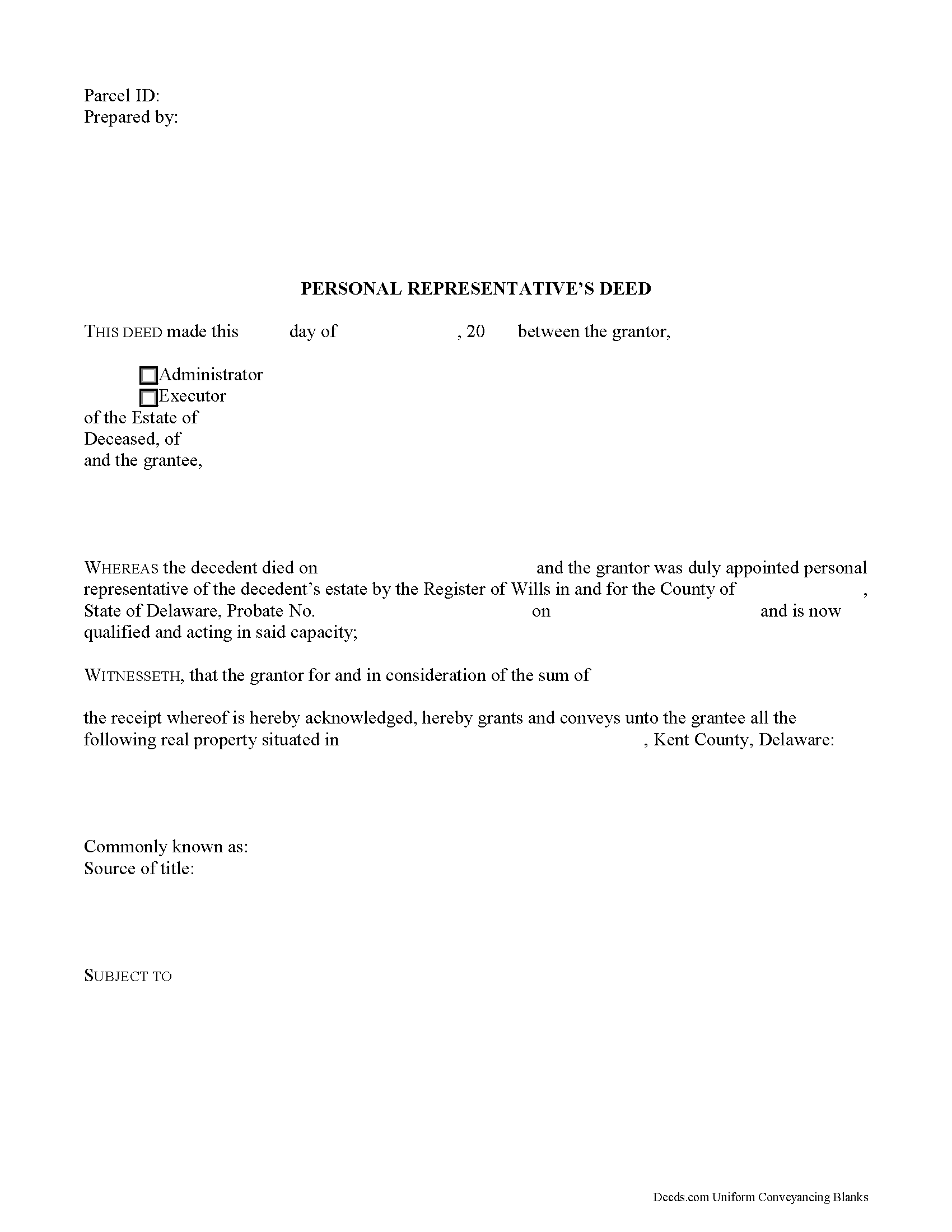
This form is for use by authorized personal representatives to convey real property.
The statutory form for a conveyance of real property in Delaware is a special warranty deed. In a personal representative's deed, the administrator or executor is the grantor, conveying all the title that the decedent had at the time of death to the grantee. The terms "grant and convey" warrant the title against the grantor and all persons claiming under the grantor (25 Del. Co. 121). In addition to requirements of a statutory deed, the personal representative's deed includes information about the decedent, including name, date of death, and information regarding the open estate.
The personal representative signs the deed in the presence of a notarial official and records the deed and all necessary supporting documents in the Recorder of Deeds office where the property subject to transfer is located.
Consult a lawyer with questions regarding personal representative's deeds or other issues with probate in Delaware.
... More Information about the Delaware Personal Representative Deed
Mortgage Secured and Promissory Note
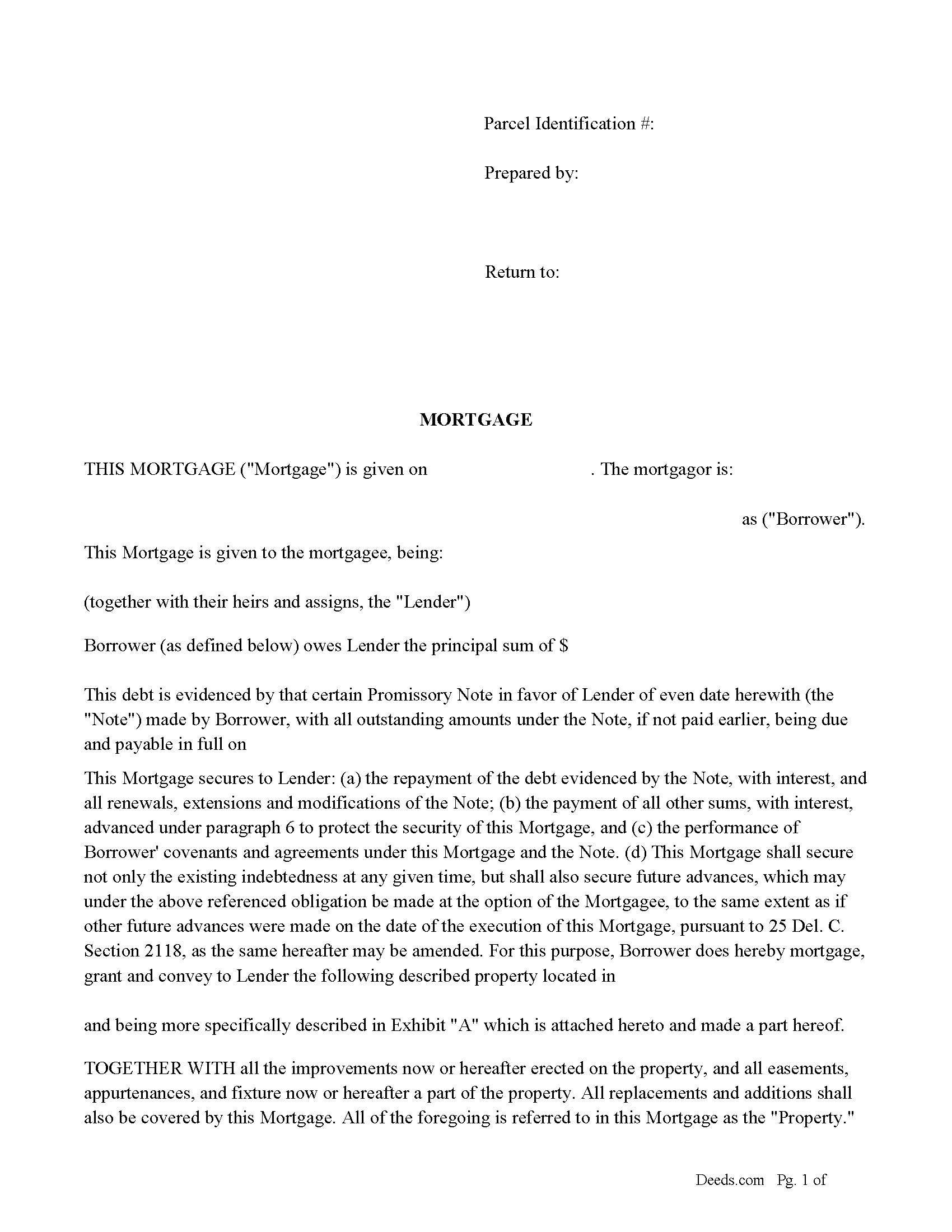
This Mortgage secures to Lender: (a) the repayment of the debt evidenced by the Note, with interest, and all renewals, extensions and modifications of the Note; (b) the payment of all other sums, with interest, advanced under paragraph 6 to protect the security of this Mortgage, and (c) the performance of Borrower' covenants and agreements under this Mortgage and the Note. (d) This Mortgage shall secure not only the existing indebtedness at any given time, but shall also secure future advances, which may under the above referenced obligation be made at the option of the Mortgagee, to the same extent as if other future advances were made on the date of the execution of this Mortgage, pursuant to 25 Del. C. Section 2118, as the same hereafter may be amended. For this purpose, Borrower does hereby mortgage, grant and convey to Lender the following described property located in Sussex County.
Governing Law. This Mortgage shall be governed by the Federal Law applicable to Lender, and to the extent not preempted by Federal Laws, the laws of the State of Delaware without regard to its conflicts of law provisions. This Mortgage has been accepted by Lender in the State of Delaware.
... More Information about the Delaware Mortgage Secured and Promissory Note
Assignment of Mortgage
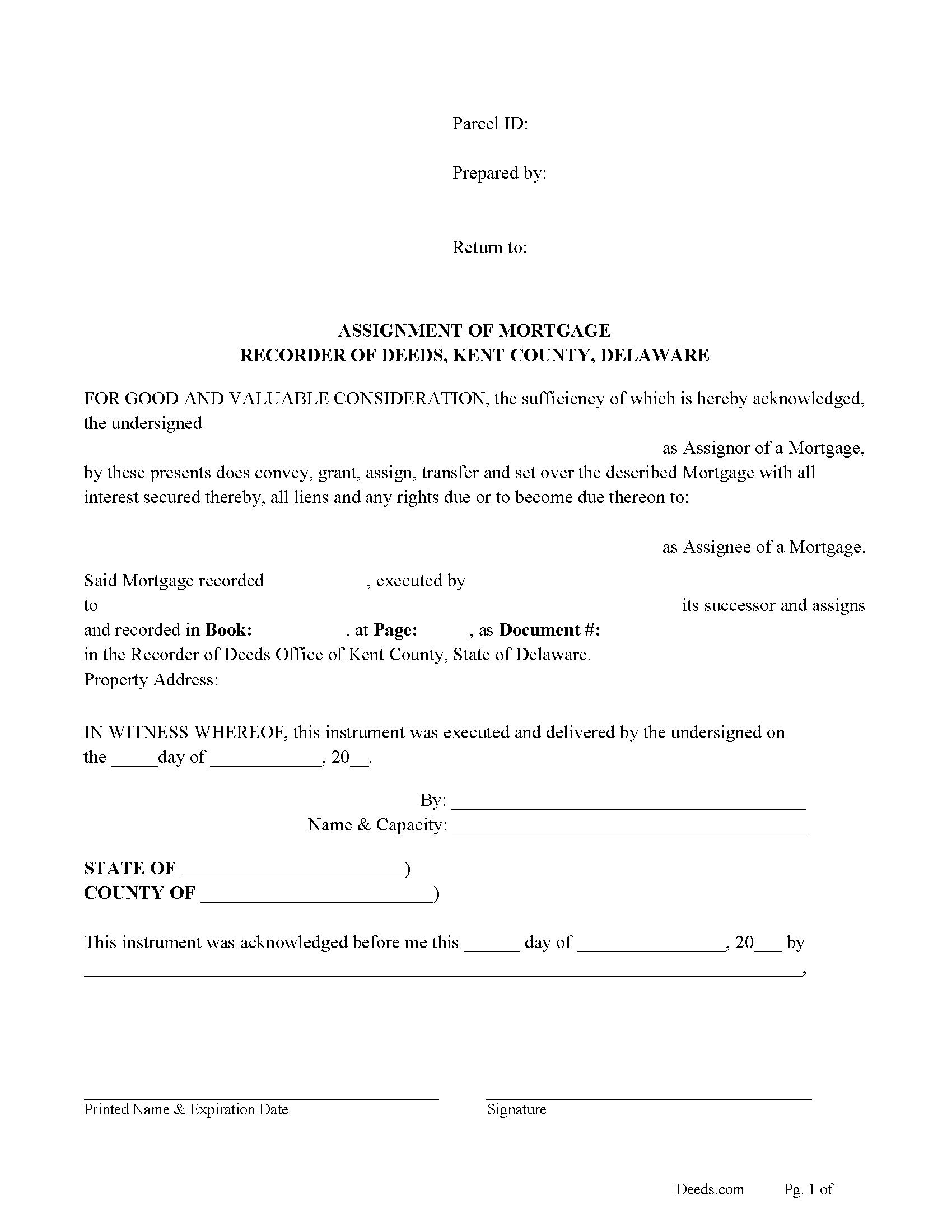
Use this form to assign a previously recorded mortgage to another person or entity.
(a) An assignment of a mortgage or any sealed instrument attested by 1 creditable witness shall be valid and effectual to convey all the right and interests of the assignor.
(b) All assignments of mortgages or any sealed instruments heretofore made in the presence of 1 witness and all satisfactions made by assignees in such assignments are made good and valid. ( 2109. Assignment of mortgages.)
Forms are specific to county recording requirements.
... More Information about the Delaware Assignment of Mortgage
Mortgage Satisfaction Piece
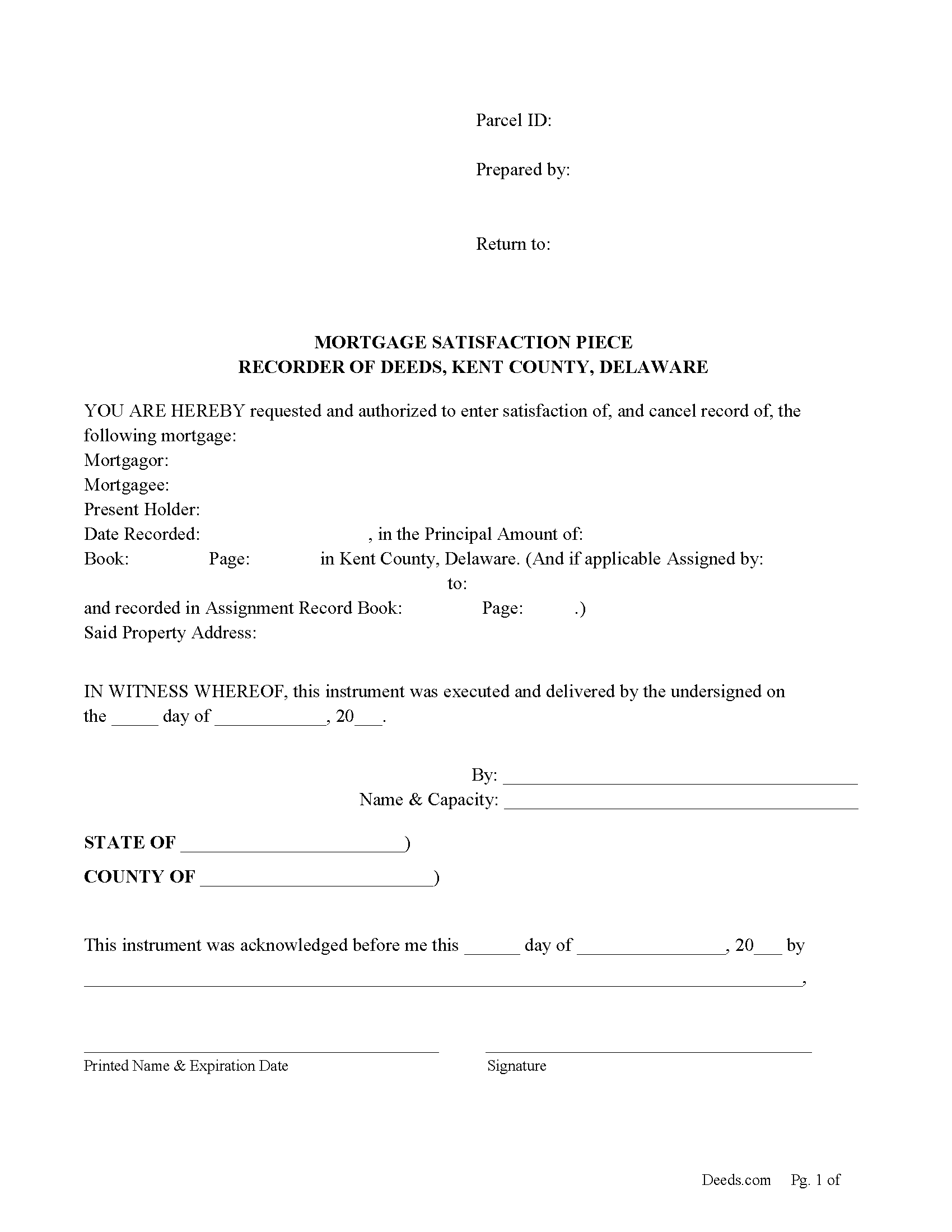
Record this form with the Sussex County Recorder when a mortgage has been satisfied/paid in full. In general, to avoid penalty (the legal holder of such mortgage or conveyance at the time the satisfaction or performance is completed shall, within 60 days after satisfaction or performance is completed, cause an entry of such satisfaction) to be made. [Whoever, being the holder of a mortgage, willfully fails to satisfy a mortgage upon the record as required by subsection (a) of this section shall be fined not more than $1,000 for each such failure together with assessed costs, for each failure, not to exceed $1,000.] ((Delaware Code Title 25. Property 2111(a)) / [ Title 25. Property 2111(e))]... More Information about the Delaware Mortgage Satisfaction Piece
Contractor Certification of Payment
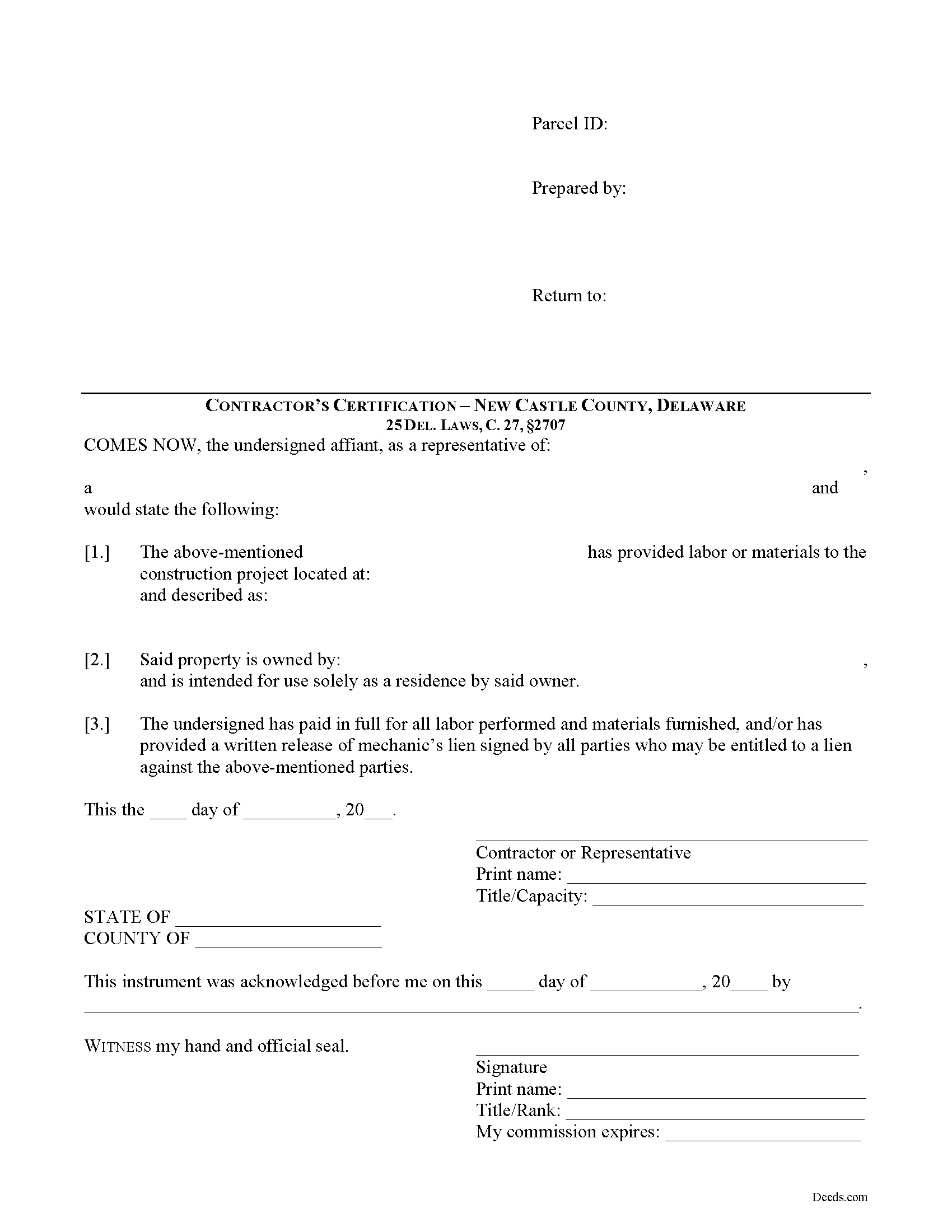
Certifying Payment for Labor and Materials in Kent County, Delaware
Under 25 DEL. LAWS, C. 27, 2707, prior to or simultaneous with the receipt of any full or final payment by the contractor, the contractor must provide the owner with one of two documents:
1) A notarized, verified written certification that the contractor has paid in full for all labor performed and materials furnished to date; or
2) A written release of mechanics' liens signed by all persons who would otherwise be entitled, containing a notarized, verified certification signed by the contractor that all of the persons signing the release constitute all of the persons who would be entitled otherwise to file mechanics' liens claims.
Providing a statement certifying the other potential claimants are paid lets the owner know that they are not at risk for a lien against their property. The certification identifies the parties, the location of the work or improvement, relevant dates, and a confirmation of payment. The contractor might also add a list of subcontractors and suppliers, along with payment dates and amounts, as well as any other information necessary for the specific situation.
Deliver the comple... More Information about the Delaware Contractor Certification of Payment
Notice of Mechanics Lien
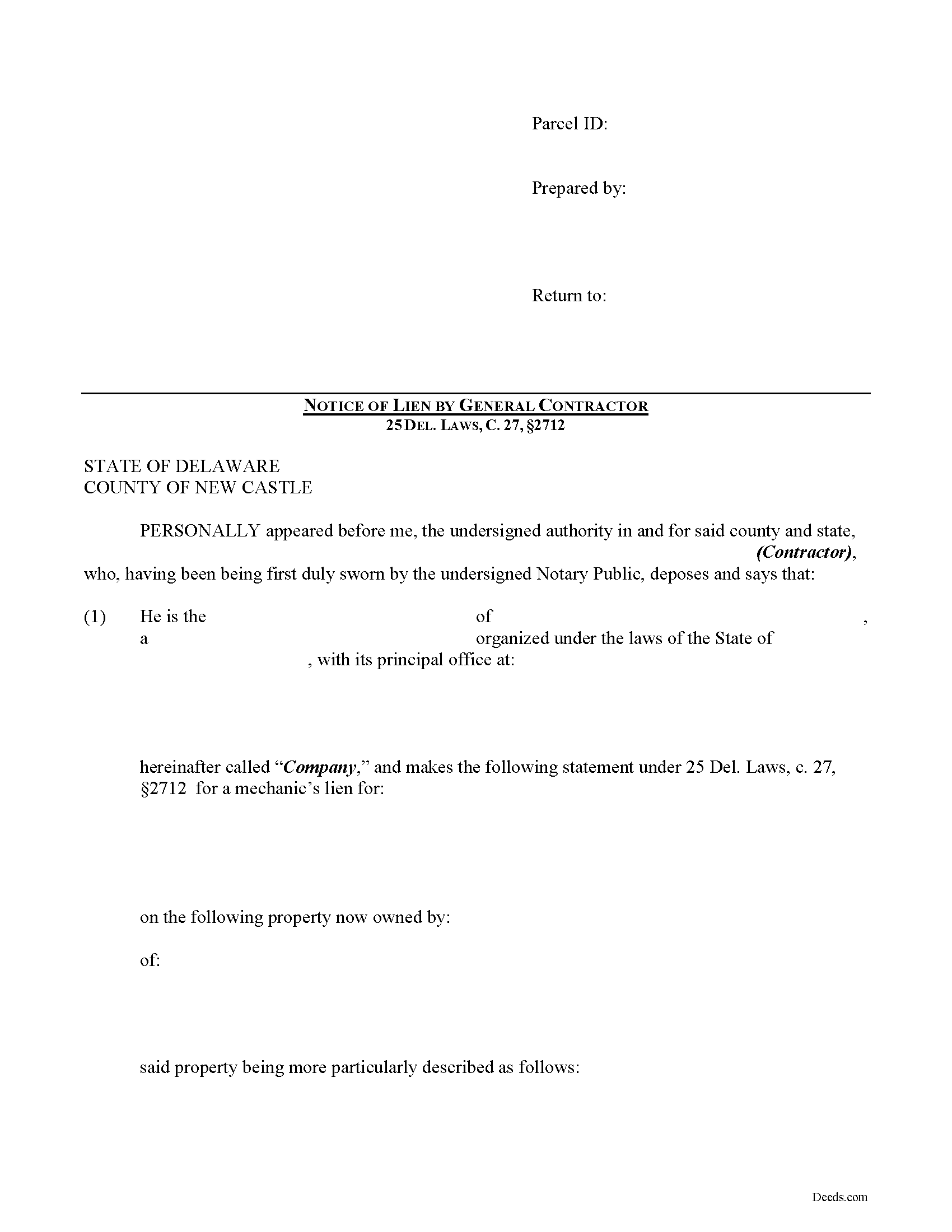
Mechanic's Liens are used to encumber the title to an owner's property when a contractor, materials supplier, or other laborer such as a subcontractor has not been paid for labor, materials, or equipment provided. In Delaware, this is accomplished by filing a Statement of Lien Claim.
Under 25 DEL. LAWS, C. 27, 2712(a), every person entitled to the benefits conferred by the mechanic's lien act and desiring to avail himself or herself of the lien provided for by state law, shall, within the time specified in this chapter, file a statement of claim, which may also serve as a complaint when so denominated, in the office of the Prothonotary of the Superior Court in and for the county wherein such structure is situated.
In addition to meeting local standards for content and format, the complaint and/or statement of claim shall set forth: (1) The name of the plaintiff or claimant; (2) The name of the owner or reputed owner of the structure; (3) The name of the contractor and whether the contract of the plaintiff-claimant was made with the owner or with the contractor; (4) The amount due; (5) The starting date for the work or materials; (6) The date the claimant's role on the project... More Information about the Delaware Notice of Mechanics Lien
Full Lien Release
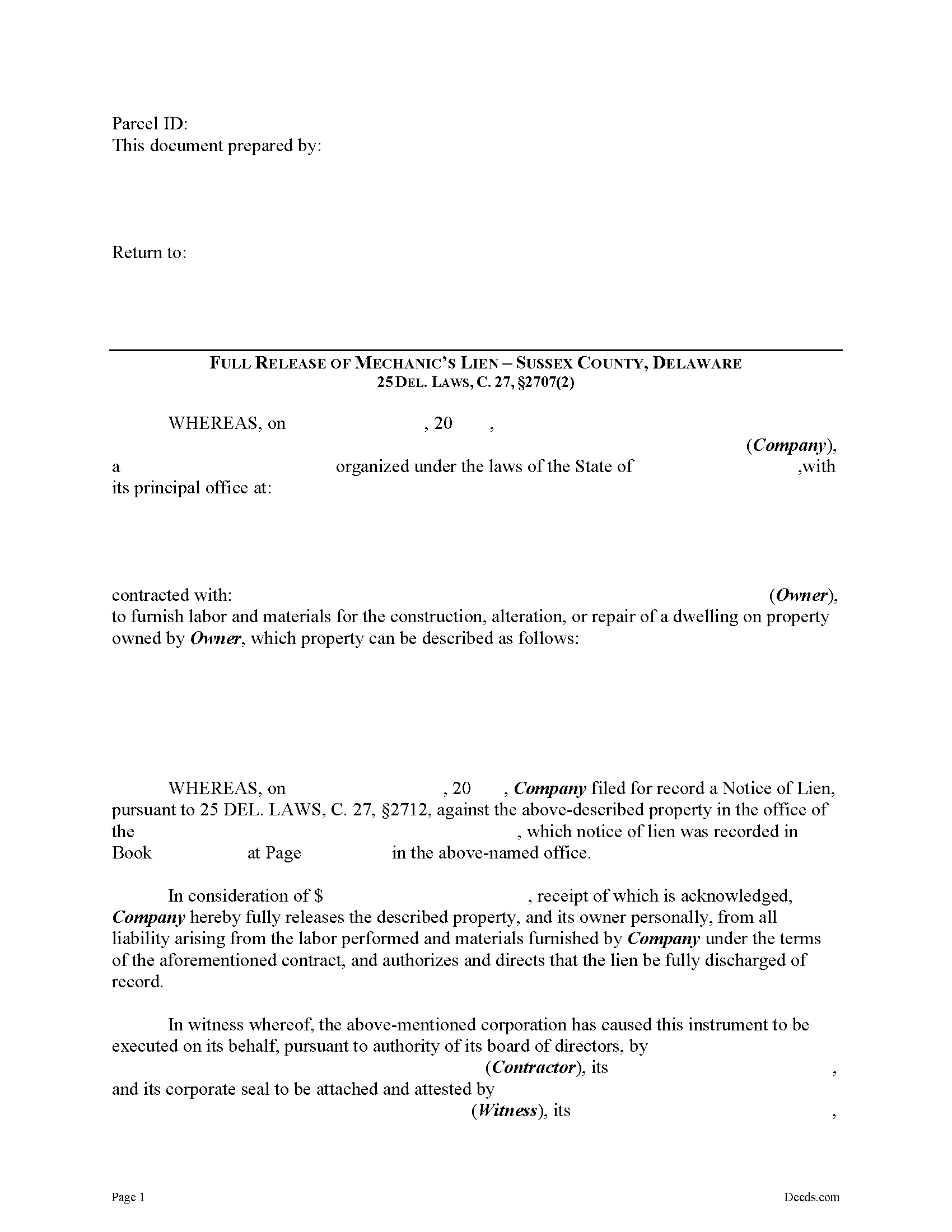
In Delaware, liens that have been paid off or satisfied for any reason should be properly discharged by filing a lien release in the country registry of deeds or prothonotary office in the county where the lien was originally recorded. Delaware law requires a lienholder to release the lien when the underlying obligation has been paid in full.
No lien shall be obtained upon the lands, structure, or both, of any owner which is used solely as a residence of said owner when the owner has made either full or final payment to the contractor, in good faith, with whom he contracted for the construction, erection, building, improvement, alteration or repair thereof. 25 DEL. LAWS, C. 27, 2707.
Prior to or simultaneous with the receipt of any full or final payment by the contractor, the contractor must provide the owner either: (1)A notarized, verified written certification that the contractor has paid in full for all labor performed and materials furnished to the date of such full or final payment in or for such construction, erection, building, improvement, alteration or repair or (2)A written release of mechanics' liens signed by all persons who would otherwise be entitled to a lien,... More Information about the Delaware Full Lien Release
Disclaimer of Interest
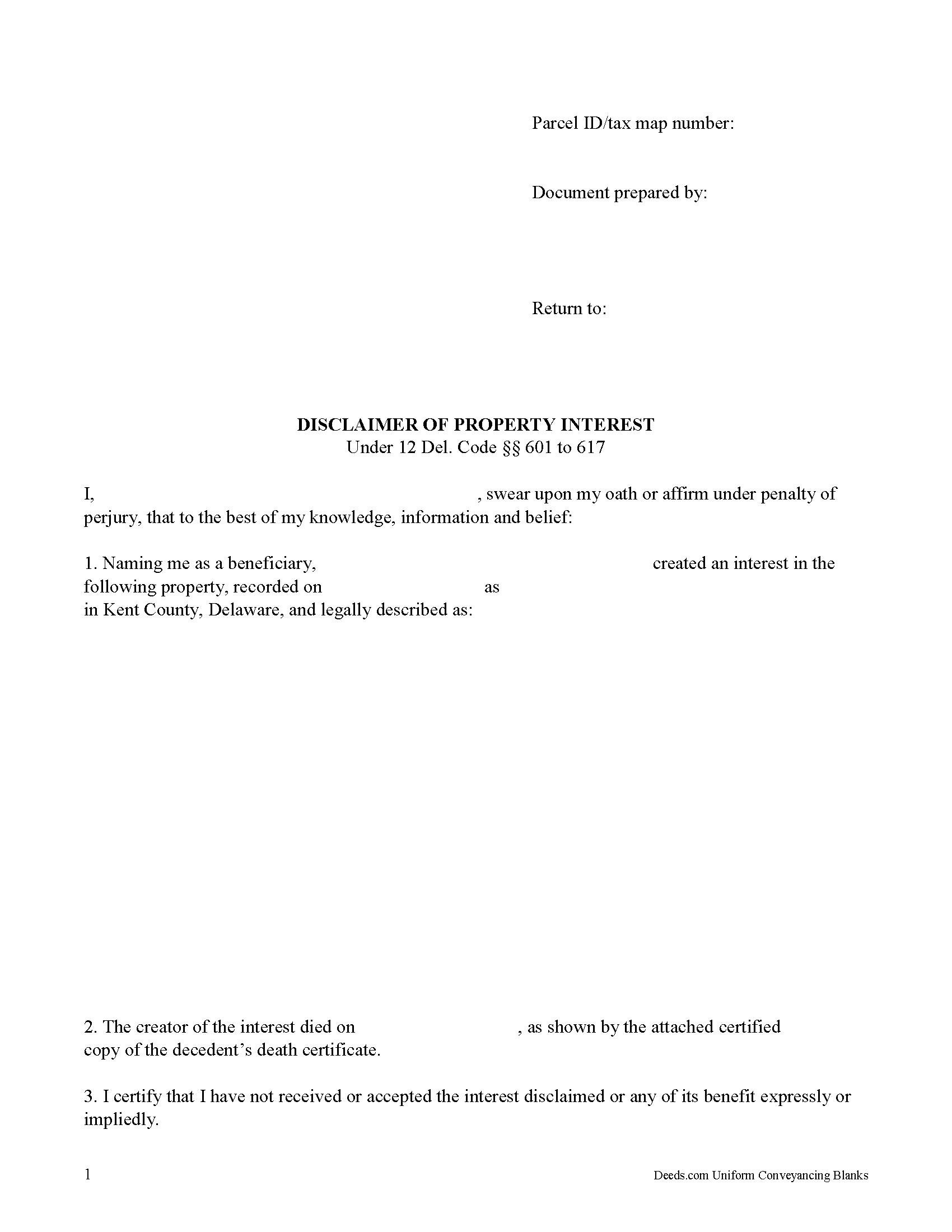
Delaware Disclaimer of Property Interest
Under the Delaware Code, the beneficiary of an interest in property may disclaim the gift, either in part or in full (12 Del. C. 601 to 617, Delaware Disclaimer Act). Note that the option to disclaim is only available to beneficiaries who have not acted in any way to indicate acceptance or ownership of the interest ( 614).
The document must be in writing and include a description of the interest, a declaration of intent to disclaim all or a defined portion of the interest, and be signed by the disclaimant ( 605 (c)).
Within nine months of the transfer (e.g., the death of the creator of the interest), deliver the document to the personal representative of the decedent's estate or the trustee. In addition, file it with the court that has jurisdiction over proceedings regarding the administration of the estate ( 612 (b)). If real property is involved, have document acknowledged as a deed and record a copy of it with the register of deeds in the county where the property is located in order to establish general validity ( 613).
A disclaimer is irrevocable and binding for the disclaiming party and his or her creditors ( 605 (e)... More Information about the Delaware Disclaimer of Interest
Certificate of Trust
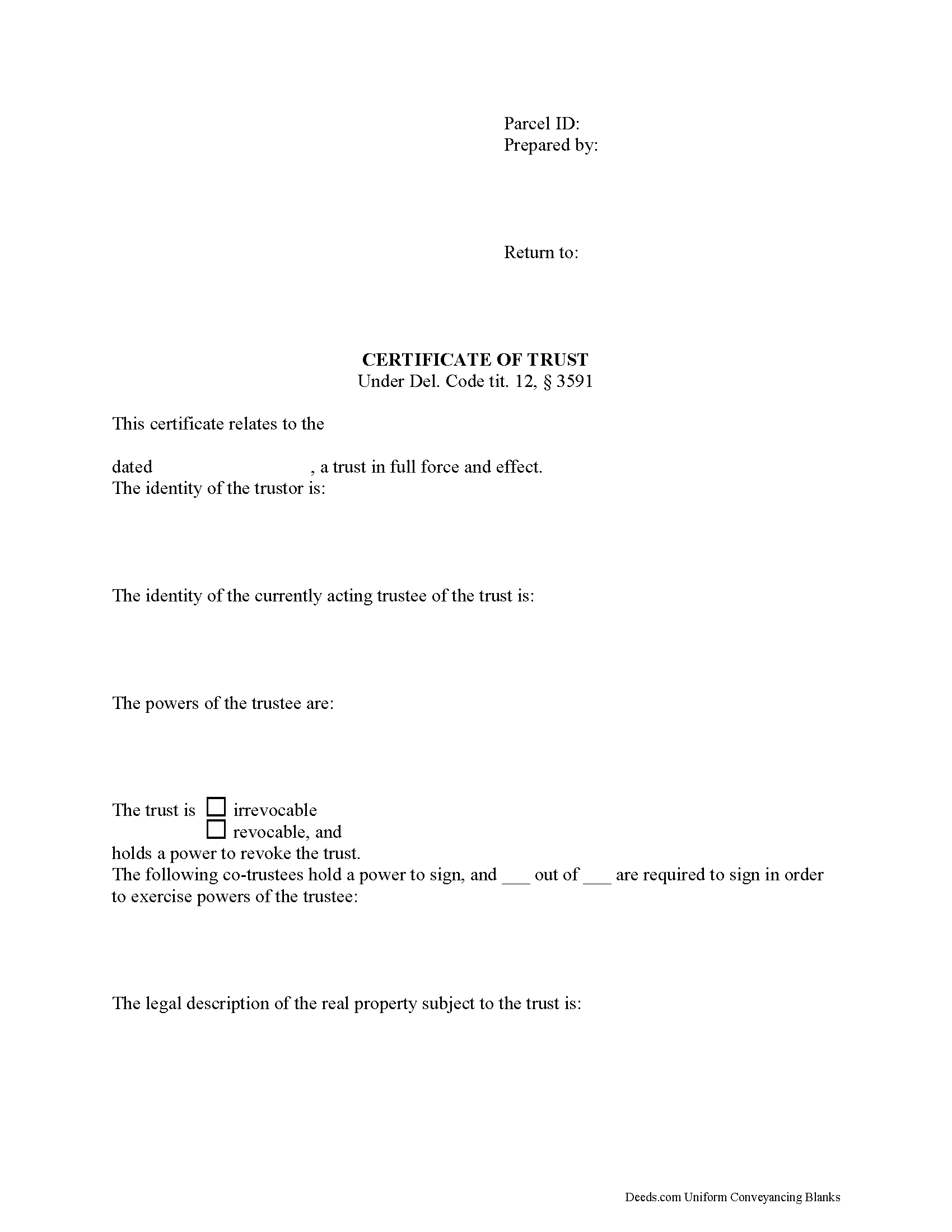
Under Del. Code tit. 12, 3591 a certification of trust presents essential information about an existing trust. Instead of providing the entire trust instrument to people who do not have a beneficial interest in the trust, the fiduciary using the certificate ensures that irrelevant or personal information remains undisclosed.
The basic information provided by the certificate includes the trust's name and date, the identity of the trustor funding the trust, and whether or not the trust is revocable, including who is able to revoke the trust. The certificate also clarifies the name by which the trust is to vest title to assets.
The certificate also validates the trustee's authority to act on behalf of the trust by naming the acting trustee, enumerating the powers of the trustee relevant to the transaction at hand, and identifying the signing authority of co-trustees, if applicable. The recipient of a certification may request copies of excerpts from the trust instrument naming the trustee and establishing the trustee's powers, but doing so opens up certain liabilities (Del. Code tit. 12, 3591 (e),(h)).
A certificate of trust also contains the trust's taxpayer ID. This numbe... More Information about the Delaware Certificate of Trust